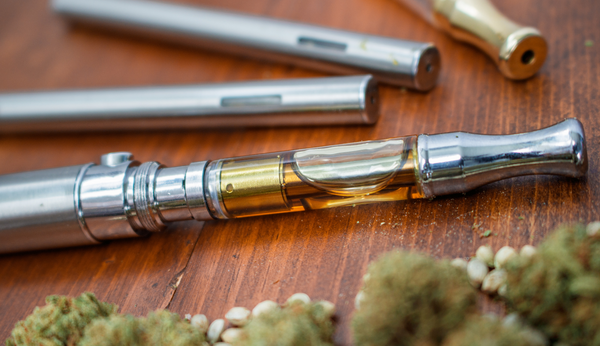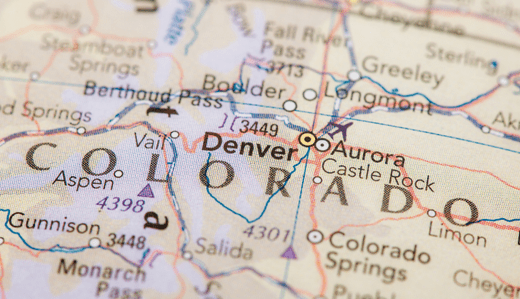Your Cart is Empty
FREE SHIPPING ON ALL ORDERS $75+
Thanks to new federal legislation, Delta-8-THC is popping up all over the U.S., but it's legal status is still inconsistent from state to state. Is Delta-8-THC legal in Colorado? Or is the cannabis-pioneer picky about THC within state lines?
Unfortunately, no, Delta-8 is illegal in Colorado.
Colorado isn't as open to Delta-8 as it is Delta-9, the primary cannabinoid circulating the state's legal cannabis market.
Here are the technical details behind Colorado Delta-8 laws:
Disclaimer: We’re always working to stay informed on the latest Delta-8 laws and research. However, state laws are subject to change and we advise that you do your own research to verify the information you find in this article. This is not intended as legal advice.
Table of Contents
Delta-8-THC and Federal Laws
Colorado Delta-8-THC Laws
Is Delta-8 a Controlled Substance in Colorado?
Delta-8-THC Possession Limits in Colorado
Is Delta-9-THC Legal in Colorado?
Where to Buy Delta-8 in Colorado
Do You Have to Be 21 to Buy Delta-8?
Is Delta-8 Legal in All 50 States?
Resources
Many states, like Alabama and California, clarify that tetrahydrocannabinols derived from legal hemp fall under the protections of hemp's legal status. Colorado has legalized hemp and CBD, but it’s stance on Delta-8 is very different.
Unfortunately, in Colorado, Senate Bill 14-184 clarifies that all tetrahydrocannabinols, including Delta-9, are defined the same way by state law. That means that any hemp material with a Delta-8-THC content that exceeds the legally allowable amount of THC (0.3%) is technically classified as "marijuana" by state law.
Of course, cannabis is legal for recreational and medicinal purposes in Colorado. By this logic, Delta-8-THC should be available in state licensed dispensaries. So, is it?
It's a little unclear—the state's Controlled Substances Act technically lists THC isomers as prohibited substances. You may find Delta-8 products in Colorado dispensaries, but they walk a fine line between legal and illegal.
In general, no, Delta-8-THC is not openly legal in Colorado and may be difficult to find in the state.
Here are some highlights from the official legislative text in Colorado:
35-61-101. Definitions.
(5) “Delta-9 tetrahydrocannabinols” has the same meaning as “tetrahydrocannabinols” as set forth in section 27-80-203 (24), C.R.S.
Colorado Revised Statutes Title 27. Behavioral Health
Section 27-80-203
(24), C.R.S(24) (a) “Tetrahydrocannabinols” means synthetic equivalents of the substances contained in the plant, or in the resinous extractives of, cannabis, sp., or synthetic substances, derivatives, and their isomers with similar chemical structure and pharmacological activity, such as the following:
(I) ¹cis or trans tetrahydrocannabinol, and their optical isomers;
(II) 6 cis or trans tetrahydrocannabinol, and their optical isomers;
(III) 3,4 cis or trans tetrahydrocannabinol, and their optical isomers.
(b) Since the nomenclature of the substances listed in paragraph (a) of this subsection
(7) “Industrial hemp” means a plant of the genus cannabis and any part of the plant, whether growing or not, containing a delta-9 tetrahydrocannabinol concentration of no more than three-tenths of one percent on a dry weight basis.
TITLE 18 CRIMINAL CODE. ARTICLE 18. UNIFORM CONTROLLED SUBSTANCES ACT OF 2013. PART 1
18-18-102. Definitions.
(18) “Marijuana” means all parts of the plant cannabis sativa L., whether growing or not, the seeds thereof, the resin extracted from any part of the plant, and every compound, manufacture, salt, derivative, mixture, or preparation of the plant, its seeds, or its resin. It does not include fiber produced from the stalks, oil, or cake made from the seeds of the plant, or sterilized seed of the plant which is incapable of germination if these items exist apart from any Uniform Controlled Substances Act 6 of 53 2016 other item defined as “marijuana” in this subsection (18). “Marijuana” does not include marijuana concentrate as defined in subsection (19) of this section.
(35) (a) “Tetrahydrocannabinols” means synthetic equivalents of the substances contained in the plant, or in the resinous extractives of, cannabis, sp., or synthetic substances, derivatives, and their isomers with similar chemical structure and pharmacological activity, such as the following:
(I) ¹Cis or trans tetrahydrocannabinol, and their optical isomers;
(II) 6Cis or trans tetrahydrocannabinol, and their optical isomers;
(III) 3,4Cis or trans tetrahydrocannabinol, and their optical isomers.
 Is Delta-8 a Controlled Substance in Colorado?
Is Delta-8 a Controlled Substance in Colorado?The state of Colorado clarifies that all isomers of THC are considered controlled substances within the state. It makes no special provisions for tetrahydrocannabinols derived from legal hemp. Instead, it bulks all tetrahydrocannabinols under the same legal definition, meaning the penalty for illicit possession of Delta-8 is likely the same as that of Delta-9-THC.
Because Delta-8 has not technically been recognized as a legal substance by Colorado State law, there are no set possession limits specifically for Delta-8.
Cannabis, and subsequently Delta-9-THC, has been legal in Colorado since 2012 for recreational use and was approved for medicinal use in 2000. Of course, there are strict regulations on how and where Delta-9 products can be bought and sold. Special possession limits also apply to Delta-9 products bought or sold in Colorado.

Because state law technically classified Delta-8-THC as a controlled substance, it's difficult to find Delta-8 in the state. Delta-8 used to be accessible in dispensaries across the state but has since disappeared from shelves in response to updates to state law.
In places where Delta-8-THC is legal (like neighboring states New Mexico, Wyoming, and Nebraska), many people prefer to shop online. It's advisable to proceed with caution when choosing a Delta-8 distributor. Shopping online allows you to buy directly from a brand or manufacturer, instead of purchasing through a third-party vendor that may not fully understand Delta-8 effects and uses or the laws surrounding Delta-8 products.
At Vida Optima, our Delta-8-THC products comply with all parameters of the Hemp Farming Act of 2018. We can also help answer questions about Delta-8 before you buy, or you can read our “What is Delta-8-THC?” guide to learn everything you need to know.
The sale of Delta-9-THC products is prohibited in Colorado, so there are no age limits set forth by state law.
Delta-8-THC is currently federally legal under the context of the Hemp Farming Act of 2018, but each state has the right to determine their own stance on tetrahydrocannabinols derived from hemp. Delta-8-THC is illegal in Colorado according to state law, but you should read more about Delta-8 laws by state to determine the legality in other areas.
No, Delta 8 THC is not legal in Colorado. The state law prohibits the sale, distribution, use, and possession of Delta 8 THC products derived from hemp.
No, you cannot legally purchase hemp Delta 8 THC products in Colorado. Both online and retail sales of hemp-derived Delta 8 THC are prohibited. Some marijuana derived products may be available in local dispensaries.
Delta 9 THC is not illegal in Colorado as long as it complies with state cannabis laws, meaning it's manufactured by a licensed grower, meets certain potency and purity regulations, and is sold only in state-licensed dispensaries.
No, since Delta 8 THC is illegal in Colorado, you should not bring Delta 8 products into the state, even if it is legal in your departure state.
Delta-8 THC is banned in several states including Alaska, Colorado, Delaware, Hawaii, Idaho, Massachusetts, Mississippi, and Montana, among others.
Delta-9 THC is derived directly from the cannabis plant and is heavily regulated, while Delta-8 THC is often synthesized from CBD and is typically a product of hemp, which is federally legal.
Comments will be approved before showing up.



